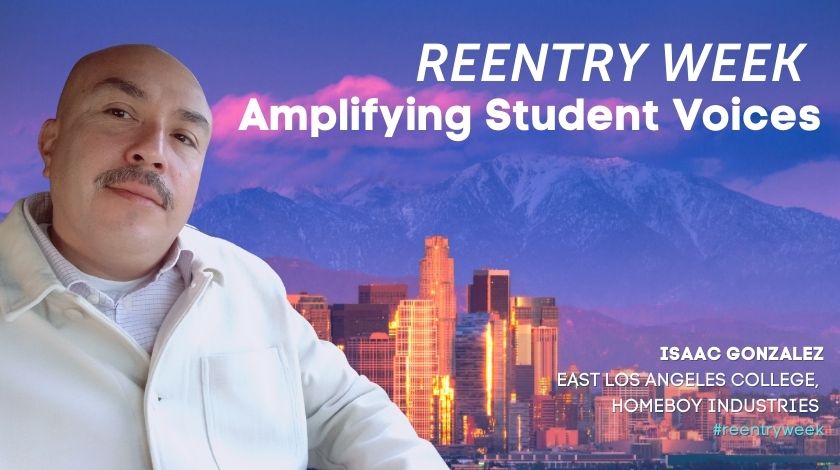April is Second Chance Month, which culminates in Reentry Week during the last week of the month. In honor of Reentry Week, we’re launching a campaign to Amplify Student Voices by featuring inspiring stories of justice-involved scholars, such as Isaac Gonzales. Isaac is both a student at East Los Angeles College and a Case Manager at Homeboy Industries.
Isaac, what are your academic and career aspirations?
Right now I’m halfway through my Associate’s degree. I’m considering pursuing my Bachelor’s and maybe even a Master’s. The way I look at it — I can do a prison term then why can’t I do a term or two in college? I’ve also been considering a career in drug and alcohol counseling because I want to help people.
What challenges have you faced as a student going through the reentry process?
After doing some time in state prison, I was able to finish my sentence in the community while wearing an ankle monitor. I finished the program, went on parole, was then connected with transitional housing, and started my job at Homeboy Industries.
The reason I share this is because this was after my second sentence. I did two prison sentences back-to-back. After the first sentence, however, I returned to my community with nothing but $200 in gate money and found myself back in the same situation as before–drugs, alcohol, violence, crime. I didn’t have any support systems.
The second time you were released was different?
Yes, this time I was set up for success with information, housing, counseling. I was also motivated to do better for my ten-year-old son. I spoke to him on the phone while I was locked up and he asked me why I kept going to prison–that broke my heart, I knew I had to change for him.
Were the resources not there during the first sentence?
No, I believe they were there and I didn’t know about them. The second time around, I put in the legwork to proactively seek resources that would support successful reentry, and I found them because I advocated for myself. I wrote to nonprofits asking for help, Project Rebound was the only one that responded.
When did you become interested in higher education?
Due to my conviction history, I didn’t qualify for certain educational programs while in prison, so I started reading and self-educating. I read countless books and took notes in the hopes of one day pursuing my degree. Obtaining an education was important to me because if I go into higher education, it increases my son’s chances of succeeding academically as well.
I also remember reading statistics that say obtaining an Associate’s degree decreases the chances of returning to prison, students who earn their Bachelor’s decrease their odds even further, and those who finish their Master’s have a virtually nonexistent chance of returning to prison. I never want to go back, and higher education can help keep me at home with my family.
Tell us about some of the support systems you rely on.
In college, I have access to counselors with whom I speak regularly. I’m part of a free textbook program. Homeboy Industries also provides services, such as tutoring and counseling, where we can talk about life—that helps out a lot.
What advice would you give to others coming home and interested in higher education?
Don’t be afraid to dream. Ignore the naysayers. Believe in yourself. Network with others in a similar situation. Most of all, don’t be afraid to ask for help.
How has the pursuit of higher education changed your life?
In the past, my choices were: do I bring a gun with me and possibly get arrested, or do I not bring a gun with me and possibly get killed? Now my choices are: do I take this class or a different class? Within my transitional housing facility, I’m inspiring my housemates to pursue higher education. I’ve also become a student-leader within the formerly incarcerated study coalition at Homeboy Industries–I went from gang leader to student-leader, who would’ve ever thought!
Learn more about Reentry Week
If you are interested in learning more during Reentry Week, the National Reentry Resource Center is a primary destination for virtual events and resources focused on a variety of reentry topics including employment, education, behavioral health, housing, youth and families, making reentry work, and the importance of evaluation.
Michelson 20MM was founded thanks to the generous support of renowned spinal surgeon and inventor Dr. Gary K. Michelson and his wife, Alya Michelson. The Michelson 20MM Foundation is dedicated to supporting and investing in leading organizations, technologies, and initiatives that seek to transform learning and improve access to educational opportunities that lead to a meaningful career. Learn more at www.20mm.org.

